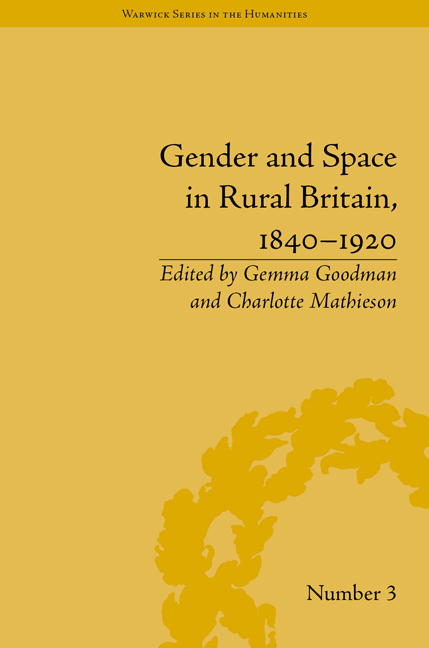Book contents
- Frontmatter
- Contents
- Acknowledgements
- List of Contributors
- Introduction: Gender and Space in Rural Britain, 1840–1920
- 1 Women in the Field
- 2 ‘Between Two Civilizations’: George Sturt's Constructions of Loss and Change in Village Life
- 3 At Work and at Play: Charles Lee's Cynthia in the West
- 4 ‘Going Out, Going Alone’: Modern Subjectivities in Rural Scotland, 1900–21
- 5 ‘Drowned Lands’: Charles Kingsley's Hereward the Wake and the Masculation of the English Fens
- 6 ‘Wandering Like a Wild Thing’: Rurality, Women and Walking in George Eliot's Adam Bede and The Mill on the Floss
- 7 ‘I Never Liked Long Walks’: Gender, Nature and Jane Eyre's Rural Wandering
- 8 Gertrude Jekyll: Cultivating the Gendered Space of the Victorian Garden for Professional Success
- 9 From England to Eden: Gardens, Gender and Knowledge in Virginia Woolf's The Voyage Out
- 10 The Transnational Rural in Alicia Little's My Diary in a Chinese Farm
- Notes
- Index
10 - The Transnational Rural in Alicia Little's My Diary in a Chinese Farm
- Frontmatter
- Contents
- Acknowledgements
- List of Contributors
- Introduction: Gender and Space in Rural Britain, 1840–1920
- 1 Women in the Field
- 2 ‘Between Two Civilizations’: George Sturt's Constructions of Loss and Change in Village Life
- 3 At Work and at Play: Charles Lee's Cynthia in the West
- 4 ‘Going Out, Going Alone’: Modern Subjectivities in Rural Scotland, 1900–21
- 5 ‘Drowned Lands’: Charles Kingsley's Hereward the Wake and the Masculation of the English Fens
- 6 ‘Wandering Like a Wild Thing’: Rurality, Women and Walking in George Eliot's Adam Bede and The Mill on the Floss
- 7 ‘I Never Liked Long Walks’: Gender, Nature and Jane Eyre's Rural Wandering
- 8 Gertrude Jekyll: Cultivating the Gendered Space of the Victorian Garden for Professional Success
- 9 From England to Eden: Gardens, Gender and Knowledge in Virginia Woolf's The Voyage Out
- 10 The Transnational Rural in Alicia Little's My Diary in a Chinese Farm
- Notes
- Index
Summary
Alicia Helen Neva Bewicke was an English feminist novelist and early leader of the Anti-Footbinding Movement in China. She was born in Madeira in 1845, but spent most of her life abroad. In 1887, at the age of 41, she married Archibald John Little and moved to Chongqing. Archibald Little was first a tea taster, and later a merchant and entrepreneur. As a British businessman who first reached China in the 1860s, Little had much prior experience in China. Alicia Little had little knowledge about China, though she had travelled widely before her marriage. After their marriage, the Littles spent nearly two decades in China between 1887 and 1907. They first stayed in Chongqing and later moved to Shanghai. After she reached China, Little studied Chinese and travelled extensively along the Yangtze River and interior areas. She visited Chinese families, took photographs, and began to write on China. Since her early twenties, Little had been interested in writing. She published her first novel, Flirts and Flirts; Or, A Season at Ryde, at the age of 23. My Diary in a Chinese Farm (1895) is probably her first account among several on China. The account started on 6 July 1893 and ended on 3 August 1894. In 1894, Little travelled to Japan for a short visit, where she met Kazumasa Ogawa, a Japanese photographer.
- Type
- Chapter
- Information
- Gender and Space in Rural Britain, 1840–1920 , pp. 145 - 160Publisher: Pickering & ChattoFirst published in: 2014



